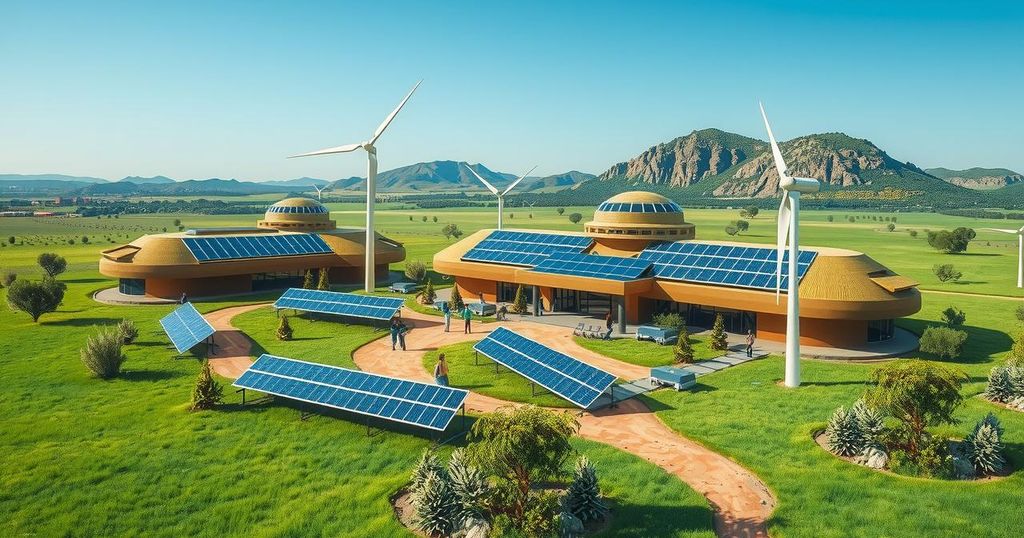This article discusses the urgent need for Europe to transition to a fossil-free military, highlighting that continued reliance on fossil fuels poses both national security and economic risks. Experts warn of a potential 50% reduction in global GDP due to climate change, making energy reevaluation critical for military security. By investing in green military technology, Europe can achieve energy independence and strategic advantage, while failing to act may result in economic decline and vulnerability to geopolitical crises.
Recently, all 27 EU heads of state convened in Brussels to implement the largest military expansion Europe has seen in decades, prompted by escalating Cold War-level tensions. However, a more immediate threat looms: climate change, a peril that no arsenal can thwart. Experts predict that unchecked climate impacts could halve global GDP in the near future. This paradigm shift necessitates a reevaluation of energy strategies, particularly within military frameworks. Europe must decide whether to entrench itself in fossil fuel dependency or to pioneer green defense technology that enhances national security while solidifying economic resilience.
Military emissions have emerged as a significant concern, as modern warfare heavily relies on oil, resulting in military operations contributing up to 5.5% of global CO₂ emissions. For instance, the U.S. Department of Defense surpasses entire nations such as Sweden in CO₂ emissions, illustrating the severity of the military’s fossil fuel dependency. Operative logistics in war zones, as seen in Iraq and Afghanistan, revealed the dangers and costs associated with securing fuel supplies, highlighting the military’s urgent need for energy diversification beyond oil.
European military leaders are acutely aware of the drawbacks linked to fossil fuel reliance. The statement, “If the military are the only ones using fossil fuels, then we will need to do our own exploration,” reflects concerns about self-sufficiency in energy logistics. Transitioning to a fossil-free military would mitigate risks associated with energy dependence on adversaries and create strategic advantages in increasingly volatile geopolitical landscapes. A planned shift toward biofuels and electrification, particularly in logistical operations, could alleviate vulnerabilities without compromising operational effectiveness.
The deeper challenge rests in energy dependency itself, which exposes military supply chains to geopolitics and economic instability. Reliance on fossil fuels threatens not only tactical readiness but also poses profound economic risks given predictions of massive GDP declines due to climate change ramifications. Europe’s military energy supply chains became notably fragile during the Ukraine conflict, emphasizing the necessity for a strategic pivot away from fossil fuels. Moreover, China’s aggressive advancement in military clean energy technology highlights the urgent need for Europe to innovate to maintain a competitive edge in modern warfare.
History demonstrates that military spending often drives technological innovation. Previous advancements originating from military research, such as the internet and medical breakthroughs, illustrate the potential for significant energy efficiency improvements. Investment in green military technology would position Europe as a leader in both strategic defense and clean energy initiatives, ensuring national security and economic development.
Recent examples of fossil-free military technology validation underscore the feasibility of transitioning away from fossil fuels. Sweden’s JAS 39 Gripen fighter jet operates on 100% biofuel, while France’s Eco Camp 2025 initiative showcases solar-powered military bases diminishing the need for conventional fuel supplies. Ukraine’s effective use of low-emission drones exemplifies the tactical advantages of transitioning away from fuel-dependent military operations, a trend essential for the future of combat.
China’s substantial investments in clean military technology—amounting to approximately $940 billion in 2024—have established its position as a main player in this domain. Outpacing Europe, China’s focus on electric vehicles, battery technology, and renewable energy systems underscores the potential repercussions of delayed action by European nations. To avoid reliance on foreign technologies and innovations, a swift transition to a fossil-free military strategy is crucial for Europe’s long-term security and economic stability.
The core of military power should aim to deter conflict rather than provoke it. An energy-independent military framework serves as an effective deterrent while also addressing climate crises. By prioritizing clean energy technologies within military modernization, Europe can achieve autonomy from unreliable oil markets and heightened resilience against energy disruptions. This commitment to innovation can enhance both economic stability and global security.
Nevertheless, Europe faces a choice between continuing fossil fuel dependence or pursuing green military investments. Current defense procurements, such as Sweden’s recent €1.4 billion contract for outdated diesel military trucks, reveal a troubling trend of locking in legacy technologies rather than embracing modern sustainable alternatives. This failure is not merely an environmental concern; it is a strategic misstep that risks European leadership in military innovation.
In conclusion, Europe stands at a pivotal junction where the choice between fossil fuel dependency and green military innovation will define its future. By investing in a fossil-free military, Europe can not only secure its energy independence but also establish itself as a leader in the global defense landscape. The imperative to shift toward sustainable military practices is not just a matter of operational readiness but a necessary step to prevent economic destabilization and geopolitical vulnerabilities in the face of climate change. Failure to act risk falling behind in the new era of military power and global security.
Original Source: www.forbes.com






